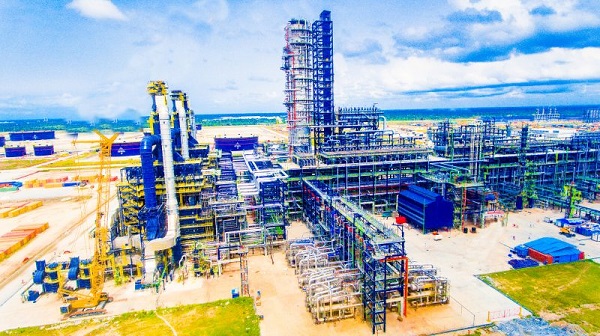President of pan-African Conglomerate, Dangote Industries Limited (DIL), Aliko Dangote, yesterday said the newly-inaugurated 650,000 barrels per day refinery would employ over 100,000 Nigerians youths, but currently has about 33,000 employees.
He also estimates that the refinery will generate about $21 billion thereby saving Nigeria huge foreign exchange (forex) that would have been used for fuel importation.
Dangote, who spoke at the inauguration of the refinery, said it marked the beginning of a journey to self-sufficiency in refined petroleum products and exportation as has been achieved in cement and fertilizer.
He decried the current fuel crisis and negative impact on the nation’s economy, which informed his decision to build a world class refinery that would reverse the trend.
He assured that the plant would be run at the highest effective and efficient level for maximum benefits to all Nigerians, adding that 40% of the production capacity will be available for export, while also guaranteeing raw materials for the plastic and pharmaceutical industries.
President Muhammadu Buhari, while applauding the doggedness and tenacity of Dangote as entrepreneur, said: “This feat at this time of the nation’s economic development clearly made this event a notable milestone for our economy and the game changer for the downstream petroleum products not only for Nigeria but the entire African continent.
“Dangote Group has helped transform our economy from heavy import dependence to a net exporter in some critical industries, including cement and fertiliser.”
He noted that recent domestic and global challenges including huge infrastructure deficits, over a decade of insurgency as well as the global financial crisis, the Coronavirus pandemic and the Russia Ukraine war, constituted a severe strain on Nigeria’s economy.
These, he said, limited the government’s ability to provide basic infrastructure without resorting to borrowing.
“Government therefore decided to focus attention on creating an enabling environment for the private sector to thrive and fill the enormous gap in investments not only in infrastructure, but also in all critical sectors.
“We recognize that without active participation of the private sector and a strong commitment to public-private partnership, the economy will not be able to continue to meet the challenge and economic growth,” he said.
The Governor, Central Bank of Nigeria (CBN), Godwin Emefiele, commending the successful completion of the project, recalled: “In September 2013, when Alhaji Aliko Dangote announced his plans for the refinery, it was estimated to cost about US$9 billion, of which US$3 billion was projected as equity investment by the Dangote Group and the balance financed through commercial loans.
“Due to an array of factors, the project was eventually completed with a total of US$18.5 billion with funding distributed into 50 per cent equity investment and 50 per cent debt finance. I am proud to state that the commercial loan component of the project was financed majorly by our domestic banks with the balance sourced from foreign banks.
“The Central Bank of Nigeria also partnered, as always, with the Dangote Group in ensuring the successful completion of the project by providing about N125 billion, to cover domestic currency requirements for the venture.
“What you may not be fully aware of Your Excellences is that the Dangote Group has started repaying some of the commercial loans even before the commissioning of this facility. This reflects the commercial capability of the Group and its Chairman. I am pleased to inform everyone today that following extensive repayments, outstanding debt has dropped appreciably from over US$9 billion to US$3 billion.”
The CBN Governor also commended Nigerian banks, saying they did not only partnered with the project through effective financing but were keenly aware of the importance of the project to Nigeria.
“They provided immense support and exceptional understanding, even when interest payments and principal repayment had fallen due.”
The Group Managing Director, the Nigerian National Petroleum Company (NNPC) Ltd., Mele Kyari, said the project would guarantee healthy competition for the benefit of the economy.
He said the NNPC is committed to value addition, noting that the new Petroleum Industry Act (PIA), will provide security of supply of refined products and protect the plant, adding that the refinery is coming on board at a time the subsidy on imported products has become unbearable for the government.
In their respective goodwill messages, Presidents of Ghana, Senegal, Niger, Benin Republic, and Chad expressed satisfaction that the Dangote Refinery will serve the West African region and that their countries would also be beneficiaries.


Comment here